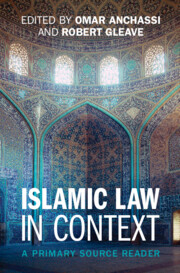Book contents
- Islamic Law in Context
- Islamic Law in Context
- Copyright page
- Contents
- Acknowledgements
- Contributors
- Introduction
- Part I Islamic Legal Theory (Uṣūl al-Fiqh) and Related Genres
- Chapter 1 Introduction to Part I
- Chapter 2 The Foundation of Analogy
- Chapter 3 The Insufficiency of Concomitance Alone
- Chapter 4 Selections from al-Manthūr fī l-Qawāʿid of Badr al-Dīn al-Zarkashī (d. 794/1392)
- Chapter 5 ‘Is Every Mujtahid Correct?’ and the Implications of Holding Incorrect Theological Beliefs for one’s Fate in the Hereafter, from the Qawānīn al-Uṣūl of Mīrzā al-Qummī (d. 1231/1816)
- Chapter 6 The ‘Innovation’ of Legal School Affiliation
- Part II Islamic Jurisprudence (Fiqh) and Related Genres
- Part III Legal Opinions (Fatwās)
- Part IV Court Judgments and Other Court Documentation
- Part V Judicial Manuals and Reference Books
- Part VI Alternative Sources for Islamic Legal Studies
- Name Index
- Subject Index
- References
Chapter 6 - The ‘Innovation’ of Legal School Affiliation
Muḥammad ʿĪd al-ʿAbbāsī’s Critique of Muḥammad Saʿīd Ramaḍān al-Būṭī (d. 1434/2013)
from Part I - Islamic Legal Theory (Uṣūl al-Fiqh) and Related Genres
Published online by Cambridge University Press: 14 November 2024
- Islamic Law in Context
- Islamic Law in Context
- Copyright page
- Contents
- Acknowledgements
- Contributors
- Introduction
- Part I Islamic Legal Theory (Uṣūl al-Fiqh) and Related Genres
- Chapter 1 Introduction to Part I
- Chapter 2 The Foundation of Analogy
- Chapter 3 The Insufficiency of Concomitance Alone
- Chapter 4 Selections from al-Manthūr fī l-Qawāʿid of Badr al-Dīn al-Zarkashī (d. 794/1392)
- Chapter 5 ‘Is Every Mujtahid Correct?’ and the Implications of Holding Incorrect Theological Beliefs for one’s Fate in the Hereafter, from the Qawānīn al-Uṣūl of Mīrzā al-Qummī (d. 1231/1816)
- Chapter 6 The ‘Innovation’ of Legal School Affiliation
- Part II Islamic Jurisprudence (Fiqh) and Related Genres
- Part III Legal Opinions (Fatwās)
- Part IV Court Judgments and Other Court Documentation
- Part V Judicial Manuals and Reference Books
- Part VI Alternative Sources for Islamic Legal Studies
- Name Index
- Subject Index
- References
Summary
This chapter explores Salafī arguments against adherence to the Sunnī legal schools in the polemical writings of Muḥammad ʿĪd al-ʿAbbāsī, with an excerpt from his Bidʿat al-Taʿaṣṣub al-Madhhabī. Salafism (Salafiyya) is among other things critical of the edifice of the Islamic school system and its theoretical underpinnings. It emerged out of an interest in reforming Islamic thought generally, combined with a dissatisfaction and perceived decline in the spiritual health of the global Muslim community. Salafīs generally have refused to accept that the Islamic tradition - in law, theology and other disciplines - deserves the reverence and authority it appears to enjoy within the Muslim community.
Keywords
- Type
- Chapter
- Information
- Islamic Law in ContextA Primary Source Reader, pp. 70 - 80Publisher: Cambridge University PressPrint publication year: 2024

